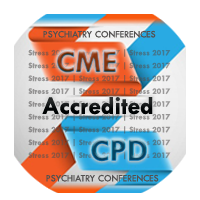Day 2 :
Keynote Forum
Denny Meyer
Swinburne University of Technology, Australia
Keynote: Evaluation of a program to reduce stress in the workplace using mixed methods

Biography:
Abstract:
Keynote Forum
Angela Neal-Barnett
Kent State University, USA
Keynote: Don't nobody care about us girl: A cultural-relevant anxiety and stress intervention for inner-city African American girls

Biography:
Abstract:
- Workshop
Location: Waterfront 3
Session Introduction
David Muss
BMI Hospital, UK
Title: The International Association for Rewind Trauma Therapy

Biography:
Abstract:
Arthur G O’Malley
Mascot Child and Family Services limited, UK
Title: The Art of BART: Bilateral Affective Reprocessing of Thoughts as a dynamic model for psychotherapy across the lifespan

Biography:
Abstract:
- Stress | Stress Therapies | Trauma | Depression| Work Stress
Location: Waterfront 3

Chair
David Truswell
Somefreshthinking Consultancy, UK

Co-Chair
Tores Theorell
Stockholm University, Sweden
Session Introduction
Denny Meyer
Swinburne University of Technology, Australia
Title: Coping with Stress: Insights from an Online Mental Health Platform

Biography:
Abstract:

Biography:
Abstract:
Deen Mirza
Clinical Educator, AT Medics, UK
Title: Professional Burnout in British GPs: Themes and Lessons

Biography:
Abstract:
Marina Ziff
The Albany Centre & Mosaic Counselling Services (CIC), UK
Title: The forbidden Stress:The Stress that’s forbidden, hidden and calls for a spiritual solution

Biography:
Abstract:
Saddiga Al-Ghalib
Effat University, Saudi Arabia
Title: Depression, Anxiety and Stress among University Students: The Case of Jeddah, Saudi Arabia

Biography:
Abstract:
Jacqueline A Hinds
Society of Emotional Intelligence, UK
Title: Leading Transformation in Healthcare and the role of Emotional Intelligence

Biography:
Abstract:
Andrew Firestone
Psychiatrists in private practice, Australia
Title: Stress at work: Psychodynamics in asymmetrical work relationships

Biography:
Andrew Firestone (MRCPsych, FRANZCP) is a Family Therapist and doing his private practice in Melbourne. He has interest in Cultural Psychiatry.
Abstract:
- Workshop
Location: Waterfront 3
Session Introduction
Lucy Lila Nelson
Certified Life Coach & Yoga Teacher, USA
Title: Yoga-based Stress Management: Introducing Yogic Principles and Practices for Stress Relief

Biography:
Abstract:
- Anxiety Disorders | Depression Treatment | Suicide and Prevention | Stress Therapies | PTSD
Location: Waterfront 3
Session Introduction
Aboelezz Mahmoud Kalboush
Alnoor Specialist Hospital, Saudi Arabia
Title: Treatment of resistant depression: Have we missed the right track ?

Biography:
Abstract:
Belinda Neil
Author - Under Siege, Australia
Title: A Teaser Exercise to Prompt Neurogenesis and restore the stressed mind

Biography:
Abstract:
Andrew John Ashworth
Breich Valley Medical Practice, UK
Title: Baby-Gaze: A neurobiological method of rapid attenuation of Symptoms of anxiety
Biography:
Abstract:
Asa Westrin
Lund University, Sweden
Title: Stress, coping and biological vulnerability in suicide attempters

Biography:
Abstract:
Pam Ramsden
University of Bradford, UK
Title: Vicarious trauma, PTSD and social media: Does watching graphic videos cause trauma?











